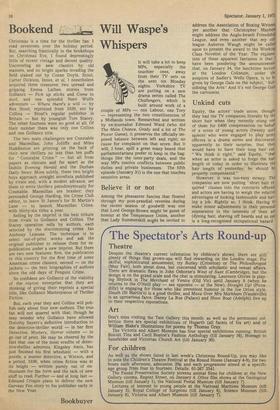Will Waspe's Whispers
It will take a lot to keep MPs, especially the touchier ones, away from their TV sets on the next six Monday nights. Yorkshire TV are putting on a new drama series called The Challengers, which is built around work of a couple of MPs — one Labour, one Tory — representing the two constituencies of a Midlands town. Researched and written by ex-journalist Edmund Ward (who did The Main Chance, Grady and a lot of The Power Game), it preserves the officially imposed balance between left and right; no cause for complaint on that score. But it will, I hear, spill a great many bean g that parliamentarians prefer to keep in the bag: things like the inter party deals, and the way MPs resolve conflicts between public duties and private businesses. The fifth episode (January 31) is the one that touches sensitive areas.
Believe it or not
Among the pleasanter fancies that floated through my post-prandial reveries during the recent season of goodwill was one that Lord George-Brown might be guest of honour at the Temperance Union, another that Lady Summerskill might be invited to address the Association of Boxing Writers, yet another that Christopher Mayheig might address the Anglo-Israeli FriendshiP League, and even another that my co/A league Auberon Waugh might he called upon to present the award to the Working Class Novelist of the Year. The explana' tion of these apparent fantasies is that I have been pondering the announcemer that, on January 24, the lunchtime lecture at the London Coliseum, under the auspices of Sadler's Wells Opera, is to be given by George Gale on the subject, Sub, sidising the Arts.' And it's not George Gale the cartoonist.
Unkind cuts
Equity, the actors' trade union, thought they had the TV companies literally by the short hair when they recently stung one of them for £400 compensation on behalf of a score of young actors (twenty quid apiece) who were engaged to play armY officers in a drama series and discovered, apparently to their surprise, that theY would have to have their long hair cut. "We think it right," said Equity, " that when an actor is asked to forgo the hair length of today in order to illustrate the hair length of yesterday, he should be properly compensated."
However, it was too-easy money. The companies are now putting 'short hair required' clauses into the contracts offered, and actors are having to weigh the relative advantages of looking fashionable and having a job. Rightly so, I think. Having to make minor adjustments in their personal appearance in the interests of their art (dyeing hair, shaving off beards and so on) is a long-recognised occupational hazard.














































 Previous page
Previous page